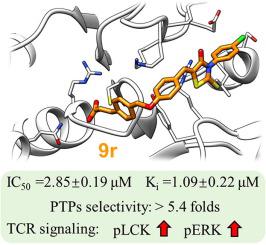Bioorganic Chemistry ( IF 4.5 ) Pub Date : 2020-07-23 , DOI: 10.1016/j.bioorg.2020.104124 Xiao Liang 1 , Huansheng Fu 2 , Peng Xiao 3 , Hao Fang 1 , Xuben Hou 1

|
Lymphoid-specific tyrosine phosphatase (LYP), which exclusively exists in immune cells and down-regulates T cell receptor signaling (TCR), has becoming a potent target for various autoimmune diseases. Herein, we designed and synthesized imidazolidine-2,4-dione and 2-thioxothiazolidin-4-one derivatives as new LYP inhibitors. Among them, the cinnamic acids-based inhibitors (9p and 9r) displayed good LYP inhibitory activities (IC50 = 2.85–6.95 μM). Especially, the most potent inhibitor 9r was identified as competitive inhibitor (Ki = 1.09 μM) and bind LYP reversibly. Meanwhile, 9r exhibited better selectivity over other phosphatases than known LYP inhibitor A15. Furthermore, compound 9r could regulate TCR associated signaling pathway in Jurkat T cell.
中文翻译:

设计,合成和生物评价咪唑烷-2,4-二酮和2-硫代噻唑并恶唑烷-4-酮衍生物作为淋巴特异性酪氨酸磷酸酶抑制剂。
淋巴特异性酪氨酸磷酸酶(LYP)专门存在于免疫细胞中,并下调T细胞受体信号传导(TCR),已成为各种自身免疫疾病的有效靶标。在本文中,我们设计并合成了咪唑烷-2,4-二酮和2-硫代噻唑烷二-4-酮衍生物作为新的LYP抑制剂。其中,基于肉桂酸的抑制剂(9p和9r)表现出良好的LYP抑制活性(IC 50 = 2.85–6.95μM)。特别是,最有效的抑制剂9r被鉴定为竞争性抑制剂(K i = 1.09μM),可逆地结合LYP。同时,与已知的LYP抑制剂A15相比,9r对其他磷酸酶的选择性更好。此外,化合物9r可以调节Jurkat T细胞中TCR相关的信号传导途径。































 京公网安备 11010802027423号
京公网安备 11010802027423号